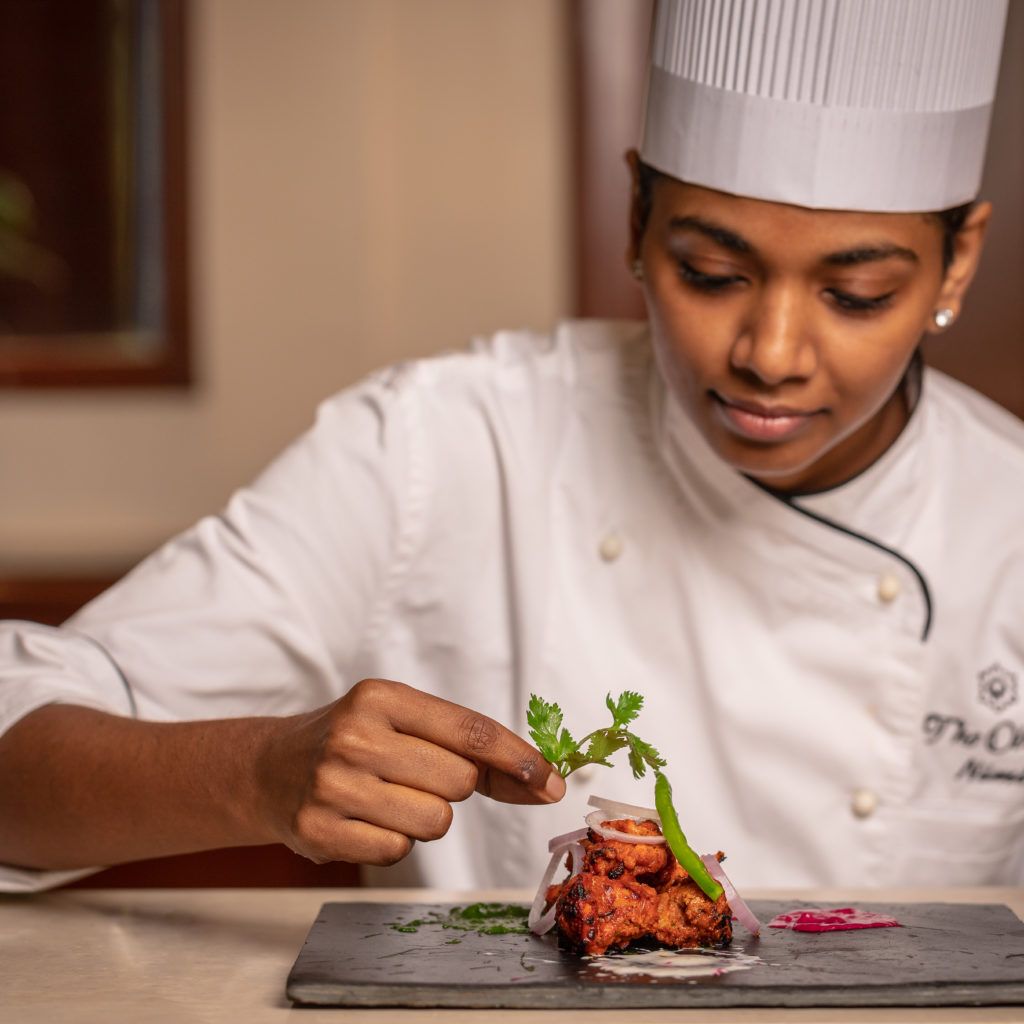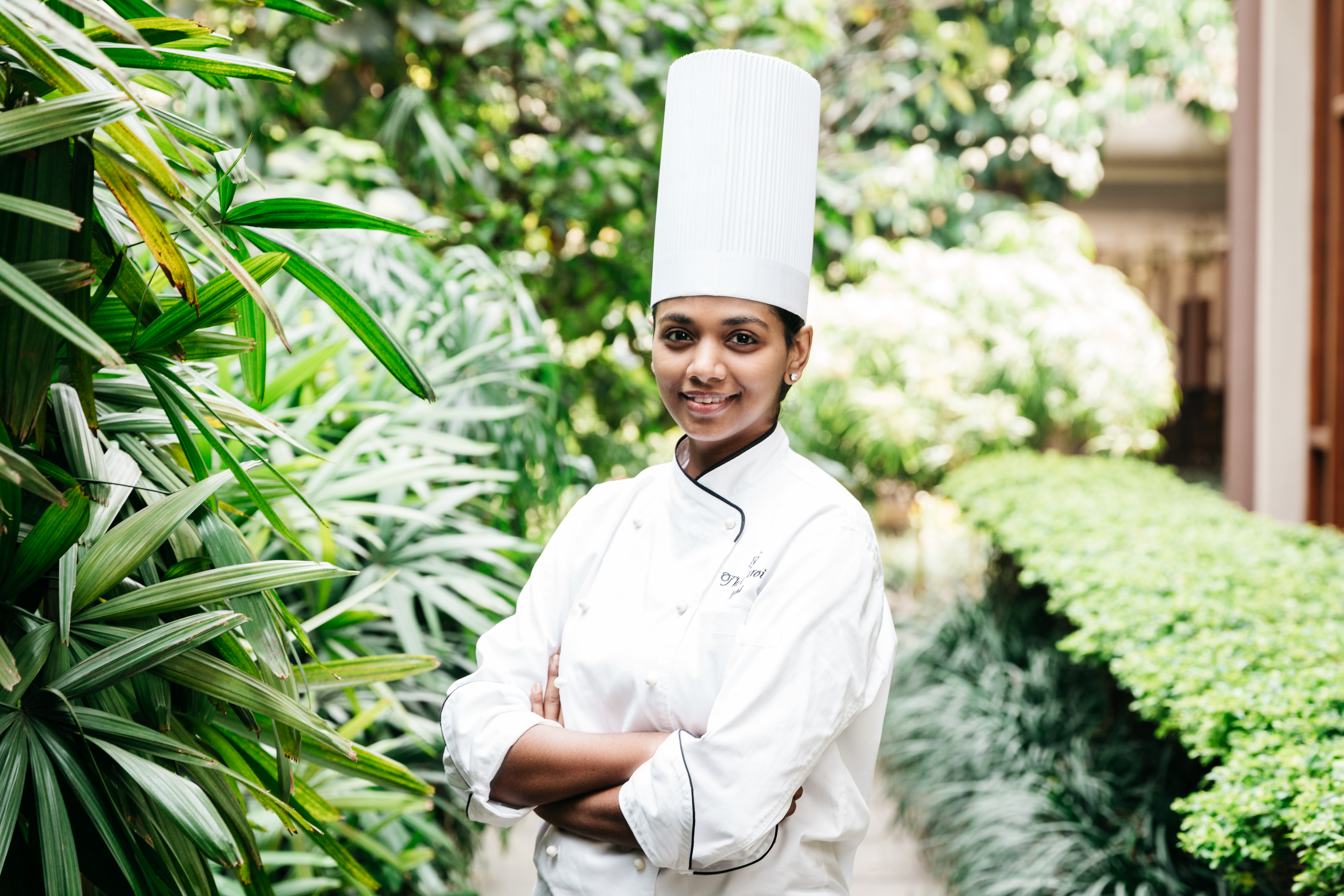

0


0

FOOD
By Banani
4 July, 2019

 Chef Nimisha
Talking about her inspiration, she mentioned her grandmother an amazing cook. She amazes to the fact of how her grandmother’s passion, curiosity, and commitment to the kitchen motivates her in the kitchen. Chef Verghese talks about Indian cuisine and the importance of using local and fresh ingredients in our diners.
BV: When most of the Indian chefs are working towards multi-national cuisines, what is the reason behind your interest in sticking to Indian cuisine?
Chef: I am a proud Indian and find the legacy, complexity, layers, and variation of our own cuisine to be fascinating and potent with more discovery. I feel, our cuisine is still underexposed and not celebrated enough whether in India or abroad. The depth of Indian cuisine and its sheer number of avatars which is influenced by geo-terrain, cultural afflictions and traditions are vast. Thus, there is so much to learn about and showcase. The indigenous diner too has not been introduced to the finer nuances and plethora of Indian regional dishes and renditions. It is a whole different story abroad, where the representation of Indian food is one dimensional and has not been given the stamp of true authenticity and lineage. Lastly, when any foreign chef makes sushi, if made well, it is applauded. But, when a Japanese chef breaks culinary barriers in making sushi, he is revered! Thus, being Indian, I want to champion our own cuisine.
BV: Majority of the chefs working on Indian cuisines give a twist to their plate. Do you prefer serving Indian food in its original form or you would like to give a twist to the taste? If Yes/No, why?
Chef: I think both lines of thinking are important and relevant to the future of Indian food. To study, practice and perfect the original and traditional recipes and techniques of Indian cuisine are critical. Not only for the health of the cuisine but for us to keep many such dying techniques alive for the future generation. But, the personal passion of a chef comes through creativity and innovation. Thus, post mastering the foundation first, one can look at giving these dishes a modern interpretation, making its presentation more skilled and artistic and even playing with ingredients to give them an interesting and novel twist. Thus, to me, both are important. One cannot experiment with the latter without having spent a large amount of time and hard work mastering the former.
BV: What most excites you in Indian cooking?
Chef: The use of spices and how each cuisine is so different from another
BV: When the whole nation goes gaga on mindful cooking and eating, how do you ensure good and healthy food being served in your kitchen?
Chef: I think it starts from the sourcing levels. We spent a lot of qualitative hours researching and finding local and hyper-local sources who supply us with fresh ingredients. Sometimes, a collective effort by the culinary community of a city or region can lead to farmers and the agro segment to thrive, to produce grains and vegetables which may have given way to bulk production and commercial farming. We further fine tune this with scrutinizing recipes and making them healthier in nature. We minimize the use of saturated fats, milk solids, excess sugar and any item which has artificial preservatives in them. Both these efforts result in allowing our diners to taste great food without feeling heavy, greasy or over spiced. And, of course, fresh ingredients always make a huge difference in both taste and appeal.
Chef Nimisha
Talking about her inspiration, she mentioned her grandmother an amazing cook. She amazes to the fact of how her grandmother’s passion, curiosity, and commitment to the kitchen motivates her in the kitchen. Chef Verghese talks about Indian cuisine and the importance of using local and fresh ingredients in our diners.
BV: When most of the Indian chefs are working towards multi-national cuisines, what is the reason behind your interest in sticking to Indian cuisine?
Chef: I am a proud Indian and find the legacy, complexity, layers, and variation of our own cuisine to be fascinating and potent with more discovery. I feel, our cuisine is still underexposed and not celebrated enough whether in India or abroad. The depth of Indian cuisine and its sheer number of avatars which is influenced by geo-terrain, cultural afflictions and traditions are vast. Thus, there is so much to learn about and showcase. The indigenous diner too has not been introduced to the finer nuances and plethora of Indian regional dishes and renditions. It is a whole different story abroad, where the representation of Indian food is one dimensional and has not been given the stamp of true authenticity and lineage. Lastly, when any foreign chef makes sushi, if made well, it is applauded. But, when a Japanese chef breaks culinary barriers in making sushi, he is revered! Thus, being Indian, I want to champion our own cuisine.
BV: Majority of the chefs working on Indian cuisines give a twist to their plate. Do you prefer serving Indian food in its original form or you would like to give a twist to the taste? If Yes/No, why?
Chef: I think both lines of thinking are important and relevant to the future of Indian food. To study, practice and perfect the original and traditional recipes and techniques of Indian cuisine are critical. Not only for the health of the cuisine but for us to keep many such dying techniques alive for the future generation. But, the personal passion of a chef comes through creativity and innovation. Thus, post mastering the foundation first, one can look at giving these dishes a modern interpretation, making its presentation more skilled and artistic and even playing with ingredients to give them an interesting and novel twist. Thus, to me, both are important. One cannot experiment with the latter without having spent a large amount of time and hard work mastering the former.
BV: What most excites you in Indian cooking?
Chef: The use of spices and how each cuisine is so different from another
BV: When the whole nation goes gaga on mindful cooking and eating, how do you ensure good and healthy food being served in your kitchen?
Chef: I think it starts from the sourcing levels. We spent a lot of qualitative hours researching and finding local and hyper-local sources who supply us with fresh ingredients. Sometimes, a collective effort by the culinary community of a city or region can lead to farmers and the agro segment to thrive, to produce grains and vegetables which may have given way to bulk production and commercial farming. We further fine tune this with scrutinizing recipes and making them healthier in nature. We minimize the use of saturated fats, milk solids, excess sugar and any item which has artificial preservatives in them. Both these efforts result in allowing our diners to taste great food without feeling heavy, greasy or over spiced. And, of course, fresh ingredients always make a huge difference in both taste and appeal.
 BV: What is your expertise in Indian cooking?
Chef: I would not consider myself an expert in Indian food. I still have so much to learn because of its varied content. However, I do love food from Kerala as I’ve grown up eating my mother’s specialties. I consider myself still a student and on my path to new learning and discovery, every day.
BV: Your thoughts on the future of Indian cooking?
Chef: People will most likely go back to the classics and the lost cuisines of India. They will also continue celebrating what our chefs bring to them celebrating these age-old traditions and giving them a more modern representation. But, I hope we do not lose touch with our roots.
To know more incredible chefs, follow us on Facebook, Instagram, and Twitter. Download our magazine Spunky Indian for exclusive stories.
BV: What is your expertise in Indian cooking?
Chef: I would not consider myself an expert in Indian food. I still have so much to learn because of its varied content. However, I do love food from Kerala as I’ve grown up eating my mother’s specialties. I consider myself still a student and on my path to new learning and discovery, every day.
BV: Your thoughts on the future of Indian cooking?
Chef: People will most likely go back to the classics and the lost cuisines of India. They will also continue celebrating what our chefs bring to them celebrating these age-old traditions and giving them a more modern representation. But, I hope we do not lose touch with our roots.
To know more incredible chefs, follow us on Facebook, Instagram, and Twitter. Download our magazine Spunky Indian for exclusive stories.